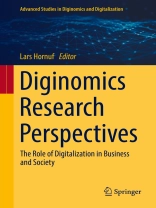This book focuses on traditional fields of business studies and economics and how digitalization has affected them. It provides an overview about the lessons learned from academic research and highlights implications for practitioners. Digitalization has not only changed the ways business administration and economics are taught, but also the substance at the core of the two disciplines. Chapters from expert contributors define and carefully evaluate the developments that have occurred over the last decades. The authors further provide an assessment of how industry branches have adapted and in which form regulators have engaged. Attention is given to the theoretical and empirical findings from recent scholarly literature. Furthermore, the authors provide some novel insights from their own research at the University of Bremen. This book appeals to business administration, economics, and entrepreneurship scholars and practitioners alike.
Spis treści
Chapter 1. Human Robo Lab: Experiments with Chatbots in Management Education at Universities.- Chapter 2. Marketing in a Digital World.- Chapter 3. Human Resource Management in a Digital Environment.- Chapter 4. Virtual Business Incubators: A Support for Entrepreneurship in Rural Areas?.- Chapter 5. Digital Dark Nudges.- Chapter 6. Machine Learning in Accounting Research.- Chapter 7. Asset Pricing in Digital Assets.- Chapter 8. Artificial Intelligence, Surveillance, and Big Data.- Chapter 9. Digital Transformation of Maritime Supply Chains Focusing on Ocean Shipping, Port Management and Hinterland Connection.- Chapter 10. Social Media Analytics in Operations and Supply Chain Management: Opportunities, Challenges and Paradoxes.
O autorze
Lars Hornuf is a Chaired Professor of Business Administration at the University of Bremen (Germany). He received an M.A. in political economy from the University of Essex (UK) and a Ph.D. in economics from LMU Munich (Germany). Previously, he was a junior researcher at the Ifo Institute for Economic Research and a research associate at the Institute of International Law at LMU Munich (Germany). He has been a visiting scholar at UC Berkeley, Stanford University, Duke University, Georgetown University, CESifo, and the House of Finance at Goethe University. From 2014 to 2017 he held a professorship in law and economics at the University of Trier (Germany). He was an affiliated research fellow at the Max Planck Institute for Innovation and Competition and currently is a Fellow of the CESifo Research Network. He works on projects concerning financial technology, data privacy, and crowdsourcing. His research has been supported several times by the German Research Foundation and different Federal German Ministries. His research interests include financial technology, law and finance, and behavioural science. Media including The Economist and Foreign Policy have reported about his research findings.












